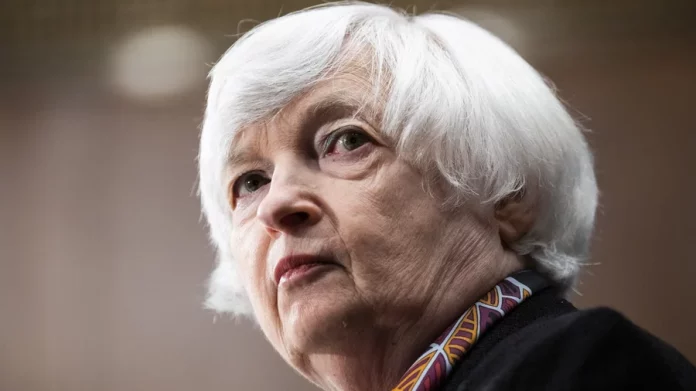U.S. Treasury Secretary Janet Yellen will arrive in Beijing on Thursday as part of Washington’s plan to improve relations at a time of rising trade tensions.
Yellen’s four-day trip follows Secretary of State Antony Blinken’s visit last month, which both sides described as “candid and constructive.” Yet on Monday, Beijing said it would start controlling exports of some gallium and germanium products — vital to the production of electric vehicles and semiconductors — in reaction to Washington’s plans to curb the sales of chipmaking equipment to China this summer.
The world’s two biggest economies are locked in a strategic rivalry, particularly in regard to technology, with each lobbing sanctions at the other to protect national interests.
Yellen and Secretary of Commerce Gina Raimondo were initially suggested by Beijing for last month’s visit, but Washington insisted on Blinken, several people familiar with the matter told Nikkei, a sign of the different priorities each side puts on the relationship.
Chinese Ambassador to the U.S. Xie Feng met Yellen on Monday, an indication of Beijing’s goodwill toward the Treasury secretary.
“The frank and productive discussion supported ongoing efforts to maintain open lines of communication and responsibly manage the U.S.-China bilateral relationship, in line with Secretary Yellen’s upcoming trip to Beijing,” NikkeiAsia quoted Yellen’s office saying in a statement.
In a speech in April, Yellen signalled her intention to restart an economic dialogue with her Chinese counterparts. This week, she will also communicate a shift in how Washington engages China — toward national security interests over economic concerns.
“We expect that the Chinese side will raise its concerns over [U.S.] ‘de-risking’ and the forthcoming White House executive order on outbound investment restrictions, and that Yellen will seek to reassure her counterparts,” said Anna Ashton, director of China corporate affairs and U.S.-China at the risk advisory Eurasia Group.
Washington is seeking to maintain trade and investment in non-sensitive industries while disentangling in sectors that could present national security or human rights concerns, Ashton said.
Since the U.S. began imposing tariffs on Chinese imports in 2018, Beijing has portrayed itself as a victim and demanded equal treatment.
“If the relationship between the two countries is on the wrong track, what is the use of ‘guardrails?'” Cui Tiankai, a former Chinese ambassador to Washington asked at a forum in Beijing on Monday, referencing U.S. President Joe Biden’s call for clear rules of engagement to avoid conflict.
Yellen’s visit comes ahead of the Biden administration’s forthcoming strategy to de-risk from China by restricting outbound investments and imposing new export controls related to semiconductors used in artificial intelligence technology.
China strongly opposes the U.S. strategy. “No matter how it is packaged, the U.S. ‘de-risking’ strategy is still about ‘decoupling’ and cutting off supply chains,” Liu Pengyu, a spokesperson at the Chinese embassy in Washington, told reporters last week. “It serves no one’s interest.”
Yellen’s visit appears to be a litmus test for Washington’s double-track approach, which is to compete with China when it should and cooperate when it can.
While pursuing its de-risking strategy, the U.S. is also trying to resume talks with China around military engagement, cooperation on climate change and controlling fentanyl production and exports.
John Kerry, the U.S. special presidential envoy for climate, is also considering a trip to China, which has Beijing hoping it can use Washington’s drive for dialogue to soften its rival’s stance on export and investment restrictions.
Critics of the Biden administration are calling on the president to stand firm. “If the U.S. does not move forward on [China investment and AI export restrictions] by August, then it will have settled back into a strategy of prioritizing engagement to the point of accommodation,” said Ivan Kanapathy, who was senior White House official for China policy in the hawkish Trump administration.
Investors, though, are preparing for protracted tensions. “The real issues are more economic and technological [in nature],” Aninda Mitra, head of Asia macro and investment strategy at BNY Mellon Investment Management, said on Tuesday at a conference in Hong Kong. “I think the scope for finding a common ground is indeed quite limited,” adding that the relationship will have to be carefully managed.









